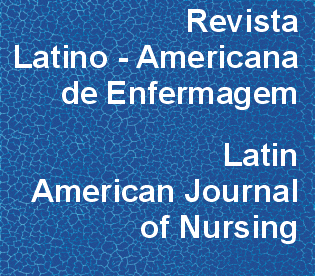Necesidades de la salud: la interacción entre el discurso de profesionales de la salud y mujeres victimizadas
DOI:
https://doi.org/10.1590/0104-1169.3455.2555Resumen
Objetivo: comprender los límites y las posibilidades evaluativas de la Estrategia Salud de la Familia en lo que se refiere al reconocimiento de necesidades de la salud de mujeres que experimentan violencia. Método: se trata de un estudio de abordaje cualitativo, fundamentado en la perspectiva de género y que adoptó necesidades de la salud como categoría analítica. Los datos fueron recolectados a través de entrevistas con profesionales de la salud y mujeres usuarias de un servicio de salud y analizados a partir del método del análisis del discurso. Resultados: el encuentro entre los discursos de mujeres usuarias y de profesionales del servicio de salud reveló como puntos en común necesidades propiamente humanas, por ejemplo la autonomía y el vínculo. La comprensión sobre necesidades limitada al reconocimiento de daños de orden física o psíquica, así como la predominancia del reconocimiento de necesidades del mantenimiento de la vida al frente a las necesidades propiamente humanas se revelaron en los discursos de los profesionales como importantes limitaciones de las prácticas. Conclusión: se destaca la perspectiva de género como una herramienta que debe ser agregada a lo cotidiano de las prácticas profesionales de la salud para confirmar o negar el carácter transformador de la asistencia en vigor, en lo que concierne al reconocimiento y enfrentamiento de las necesidades de la salud de las mujeres.Descargas
Los datos de descarga aún no están disponibles.
Descargas
Publicado
2015-04-01
Número
Sección
Artículos Originales
Licencia
Los derechos de autor son propiedad exclusiva de la Revista Latino-Americana de Enfermagem (RLAE), transferidos a través de la Declaración de Transferencia de Derechos de autor (que está en el formulario individual de declaración) firmada por los autores. Para el uso de artículos, RLAE adopta la Licencia Creative Commons CC BY-NC atribución no comercial (abstracto o código completo de licencia). Con esta licencia es permitido acceder, descargar (download), copiar, imprimir, compartir, reutilizar y distribuir los artículos, desde que para uso no comercial y con citación de la fuente, dando los créditos de autor a la Revista Latino-Americana de Enfermagem. En tales casos, no se necesita permiso de los autores o editores.Cómo citar
Oliveira, R. N. G. de, & Fonseca, R. M. G. S. da. (2015). Necesidades de la salud: la interacción entre el discurso de profesionales de la salud y mujeres victimizadas . Revista Latino-Americana De Enfermagem, 23(2), 299-306. https://doi.org/10.1590/0104-1169.3455.2555



